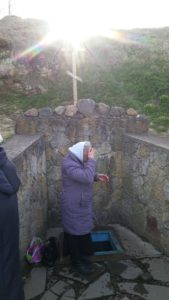by Grace Love ’19

Woman collecting holy water from sacred fountain in Russia. Photo by Carter Gunnigle.
The Eastern Orthodox Church is the second largest Christian church in the world. Its followers, who live mainly in Eastern Europe and Greece, follow the Nicene Creed and see the church as continuing the traditions established by Jesus and his disciples. The term “eastern” reflects the split in 1054 CE (AD) between Orthodox Christianity in the east, and the Roman Catholic Church in the west. The Orthodox Church lacks a central church government. Its holidays follow a different calendar from the one most Christians use today. Eastern Orthodox Christians attend services called Divine Liturgy once a week, and fast regularly.
Carter Gunnigle (’18) joined the Eastern Orthodox Church around 5 ½ years ago after much research into different Christian sects. The emphasis on tradition and consistency in Orthodox religions resonated with him. He began talking with a hieromonk (both monk and priest) when in Texas and shortly thereafter found himself at home in the church. Since then his religious beliefs have become an extension of who he is both spiritually and mentally. They have become part of his identity.
Orthodoxy focuses a lot on tradition and ritual. Carter takes comfort in this. He has found that routine and historical consistency in his religion allow for a sense of community with all people who practice it, no matter who or where they are. He’s been to Christian Orthodox churches in the Greek tradition, and though he didn’t understand the language, he still felt connected. The people there worship with almost the same routine and mannerisms as his own congregation. This was also true when he visited Russia, where he spoke the language and was happy to experience being in a majority Orthodox country. Across the globe, the Eastern Orthodox tradition encourages a continuation of historical thought and heritage, so everyone who practices it shares a common foundation. Divine liturgies are the same across the globe for Orthodox Christians, based on a chain of tradition going back to the earliest Christians. This reinforces a sense of holiness and connection for Carter.
Carter’s religious identity is strong, even though very few people share his religion on campus. He wants to share his tradition because it is little known and therefore might be subject to stereotypes. While the religion may ask a lot from its followers, this does not extend into a cruel or prejudiced attitude towards others. He does not see religion as something that should judge or exclude others. For the Eastern Orthodox, dictating morality to others is strictly forbidden.
Carter finds God in communal prayer, when the congregation is singing together, in the hymns they recite. For him, God is present in the church setting, and with the people there. Though Liturgy takes place only on Sundays, every day is a day of worship for Gunnigle. He prays every night. He also partakes in weekly fasts when he can, abstaining from animal products on Wednesdays and Fridays. He also follows the tradition of fasting during the four fasting periods of Nativity, Pentecost, Dormition, and Lent.
This is not obedience to a legalistic command or a forced act. For Carter fasting is an emotional experience and a show of respect towards the Divine.
The Divine which Carter experiences is a God of life, of love in its most pure form. He believes God is everywhere in the world. Walking through the Arboretum every day to and from classes, Carter likes to stop and pay attention to all of the things in nature that get overlooked. To see the breathtaking beauty of it all.
He especially finds beauty in diversity. Growing up in southern Florida, Gunnigle was surrounded by a mixture of various religions, ethnicities, and types of people, and he values that kind of environment. This desire for harmony and connection between different people and their religious traditions is what guides him in interfaith dialogue.
“We are all creatures created by the Divine to be who we are and that’s beautiful.”